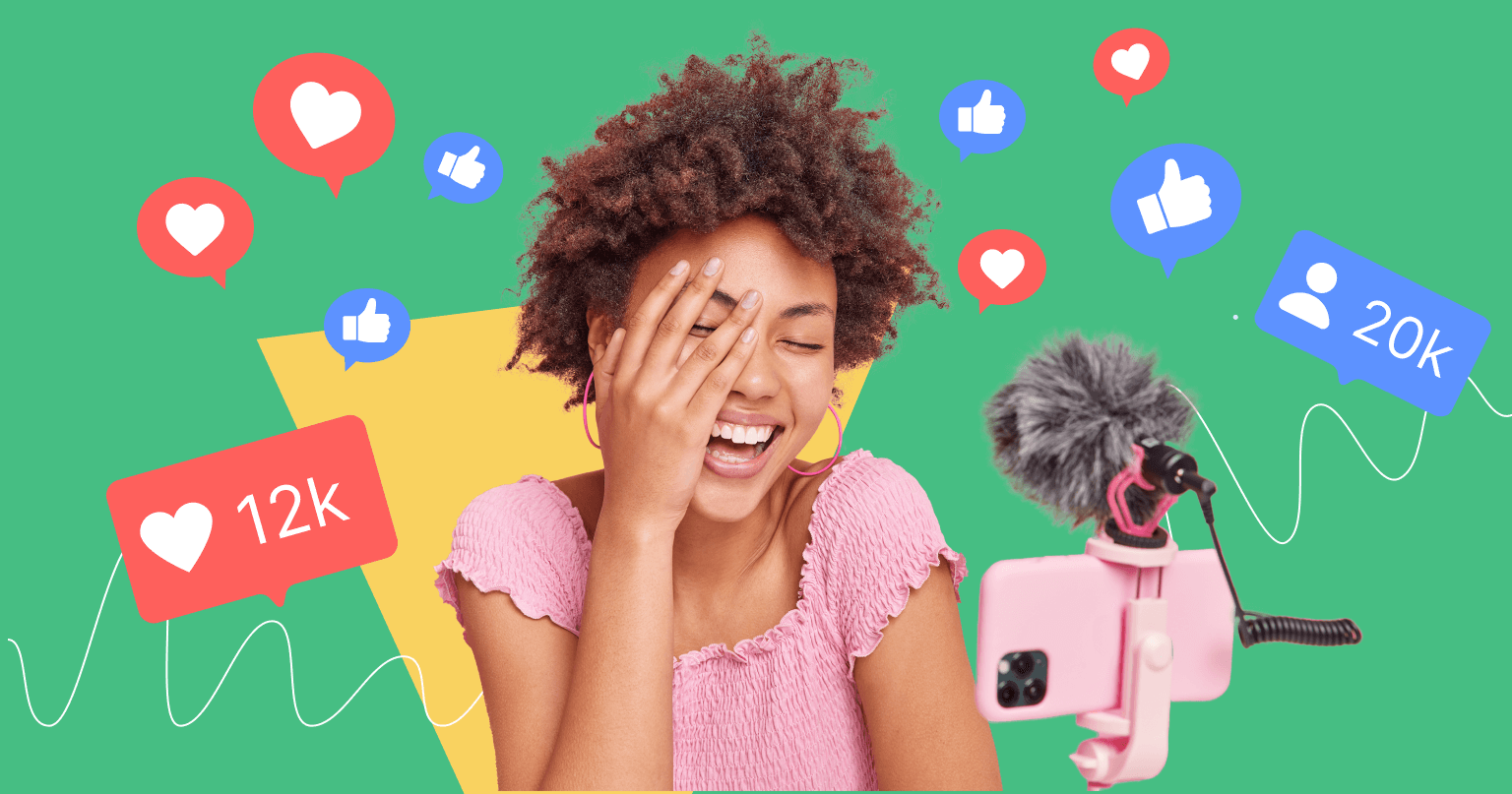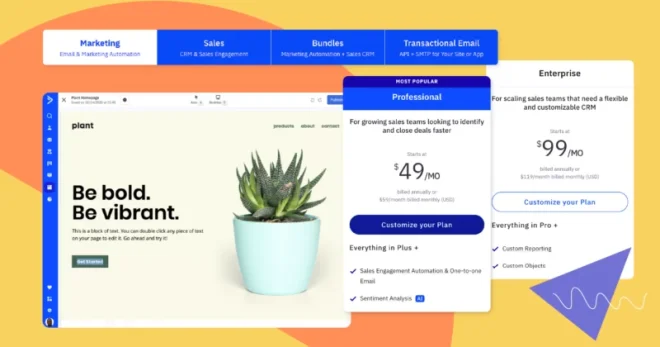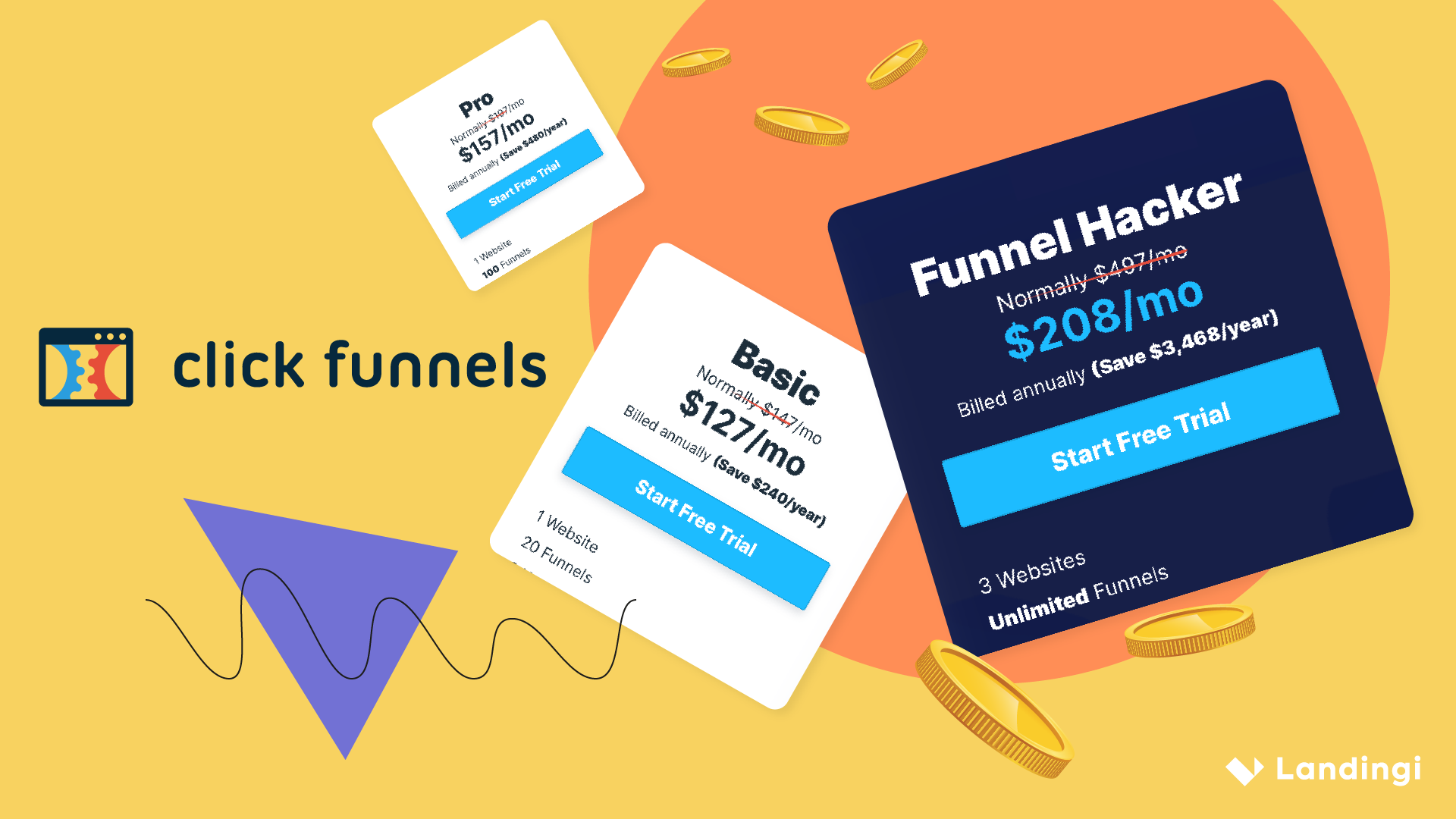If you’ve heard of influencer marketing, you’re not alone. Spending on influencer marketing has increased across the board, projected to reach a total of $21.1 billion this year (Viralyft, Influencer Marketing Statistics, 2023). Money like that speaks to the power of influencer marketing, but how exactly does it fit in with digital marketing, and what does it mean to you and your brand?
If you find that you’re still confused about influencer marketing — what is it? Who is it for? Is it a smart investment? — you’ve come to the right place.
We’re going to define and compare digital marketing versus influencer marketing to help you stay in the know with the latest advertising trends. Then, you can figure out what works best for you and if you need to upgrade your marketing efforts.
Influencer Marketing in Digital Marketing
Social media has become integral to the way we communicate, consume content, and connect with audiences. It continues to change the game of digital marketing, and influencer marketing is the next big thing.
With the growth of social media platforms, content creation has expanded and earned a significant following. “Influencer” is the term we use to refer to someone on these platforms who is driving a new wave of content creation and engagement. A sort of internet celebrity, if you will.
With follower counts sometimes in the millions, these creators open new and natural routes for digital marketing. In short, influencer marketing is a new type of digital marketing.
That said, it’s important to understand details if you want to optimize your advertising campaigns and make use of digital marketing in any form, especially one as nuanced as influencer marketing.
What is Digital Marketing?
Digital marketing is any kind of marketing that uses the internet or online platforms to communicate with customers and promote products. It can include different technology mediums, tools, devices, and approaches.
For example, many brands plan different digital marketing strategies to target mobile and desktop users, or customers browsing Facebook versus searching in Google.
Using analytics, it’s easy to track the results of your digital marketing campaigns and, as a result, calculate your return on investment (ROI).
Businesses can be specific with their campaign spending and collect accurate data, allowing them to specify their target audiences based on factors such as age, gender, and location.
Digital marketing helps generate and improve website traffic and SEO. Let’s look at some of the most common types of digital marketing.
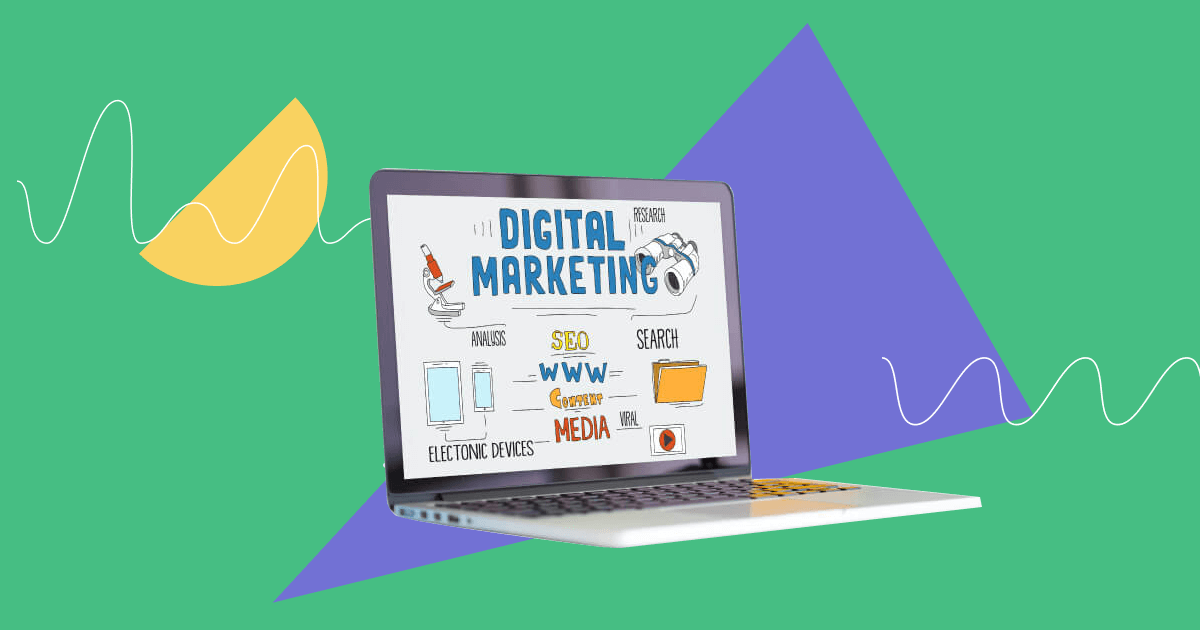
PPC
Pay-per-click (PPC) is one of the most popular and efficient digital marketing strategies. Often used to increase website traffic and engagement through targeted ads, PPC hinges on efficacy and economy.
The cost of PPC campaigns depends on how many clicks you’re getting and how much those clicks cost. It has proven successful across various platforms and niches and continues to play an important role in digital marketing.
For successful PPC campaigns, a dependable landing page is essential. Check out our examples of the best PPC landing pages to get some inspiration.
SEO
Search Engine Optimization (SEO) helps people to see your website in their search results. As Google and other search engines have continued to evolve, SEO has as well. With changing search algorithms and other updates affecting ranking factors, this digital marketing strategy has become more complex.
That doesn’t mean, however, you should let it fall by the wayside. It’s a crucial tactic in order to keep up with the competition and get your small business or product page in front of the right audience.
Content & Social Media Marketing
The basis of successful content marketing comes down to relevance, value, and entertainment. It’s important that if you’re producing content, you’re keeping your audience both interested and entertained while still providing some sort of value.
Make your sections smartable and let go of mundane manual tasks with Smart Sections! An easy way to manage bulk changes.
Effective content marketing cuts through the thousands of other advertising messages people see every day. This usually means your brand has to be active on social media and engage with your audience on a regular basis. Publishing content for your target audience can solidify your social media presence and increase your reach.
- INFLUENCER MARKETING TIP: Collaborate with influencers and run their content on your brand’s channels. By partnering with influencers who align with your brand values and target audience, you can tap into their credibility and engaged following to expand your reach and drive engagement. Sharing influencer content on your brand’s channels not only adds variety to your content mix but also strengthens your brand’s social proof and authenticity, as well as fosters valuable relationships with influencers in your industry. This collaboration is a win-win situation as it allows brands to market themselves and drive traffic to their channels, while influencers themselves love being in-the-know about industry news and gaining exposure to new audiences through brand partnerships. Remember to properly attribute and give credit to the influencers, and ensure the content aligns with your overall branding and messaging.
What is Influencer Marketing?
Consumers tend to trust recommendations from third parties more than they trust a brand itself. In fact, 70% of people will trust a review from a complete stranger. Now, imagine you replace that stranger with someone’s favorite online personality, who’s promoting your product or services to their followers in a way that feels natural and relatable.
Influencers are unique players in the digital marketing sphere because they have the power to affect purchasing decisions based on their authority, knowledge, position, or relationship with their audience.
Examples of influencers include:
- Life-style bloggers
- YouTubers
- Podcasters
- Streamers
- Models
- Authors
When you expand your digital marketing efforts to collaborate with influencers, you have the opportunity to engage with potential new customers across markets and niches.
Say you find an influencer that shares content that seems relevant to your brand, and they seem like a good fit. If they agree to collaborate with you, where do you go from there? How do you find a place for this influencer to fit into your current digital marketing strategy?
These individuals are not simply marketing tools, but rather intermediaries with powerful social relationships. Let’s look at a few examples of commonly seen types of influencers and collaborations.

Types of Influencers
Brand Ambassadors
Brand ambassadors will help you share your products and the mission of your brand with a larger audience. With social media, these influencers help create a larger impact for your brand. How potential customers view your brand can be crucial to your marketing and sales efforts.
Influencers help create campaigns that solidify a certain message and perspective for your brand while also creating new opportunities for engagement.
When selecting brand ambassadors for your influencer marketing, choose those who genuinely align with your brand and integrate their content with personal style and values. A good ambassador should have a substantial following, drive engagement, and maintain credibility through honest and transparent content.
Affiliate Marketing
In many cases, affiliate marketing becomes heavily intertwined with influencer marketing. Influencer marketing can often be seen as an extension of affiliate marketing since influencers can become affiliates of certain brands and then help advertise the products that they also earn a commission on.
This can work as a long-term marketing and sales strategy since both the audience and influencer can grow alongside your brand as you build meaningful marketing and customer relationships.
Through affiliate marketing strategies, you can collaborate with multiple influencers at the same time across platforms or across market niches. This can help you extend your reach in both numbers and the diversity of your customer base.
Micro-Influencers
Influencers come in all shapes and sizes, you might say, and some might work better for your marketing campaigns based on the size of their following. Many marketers believe that micro-influencers are influencers with between 1,000 and 100,000 followers, and they’re a great choice if you’re looking to optimize your ROI.
Micro-influencers are often highly engaging, and their followers tend to think highly of their authenticity. From the perspective of your brand, they can be a great economic choice, as well. Due to their smaller following, they tend to charge lower rates for their services.
Some micro-influencers might be just at the beginning of their social media journey as well. Connecting with them at this level could help lay the groundwork for a successful and long-term working relationship with high levels of energy, creativity, and engagement.
There are also nano-influencers, with a smaller yet dedicated following, usually ranging from 500 to 10,000 followers. They are highly focused on a specific niche and can have a significant impact on their closely connected community.
Industry Experts
These influencers are well-respected professionals or experts in a specific industry. They share their knowledge and insights through thought leadership content and have a loyal following that values their expertise and recommendations.
Brands can use their expertise to build trust and engagement with a targeted audience, align with relevant, high-quality content, and gain exposure to potential customers. Industry experts often create educational and informative content that resonates with their followers, who seek trustworthy information and advice. By collaborating with industry experts, brands can participate in discussions, gain exposure to the expert’s community, and foster meaningful connections with potential customers who trust and value the expert’s recommendations.
Celebrity Influencers
Celebrity influencers are well-known personalities in various industries, including entertainment, sports, or fashion. They have a large following and can greatly impact brand perception and reach.
Celebrity influencers can help brands reach a diverse audience. Their aspirational appeal can make their followers want to emulate them, making products more desirable. Celebrity endorsements can boost brand awareness, credibility, and trust.
Get 111 Landing Page Examples—The Ultimate Guide for FREE
How To Create an Influencer Marketing Strategy?
Creating an influencer marketing strategy involves several key steps. Here’s a simplified guide on how to develop an effective influencer marketing tactic:
Define Your Objectives
Start by clearly defining your goals and objectives. Determine what you want to achieve through an influencer marketing campaign, such as increasing brand awareness, driving website traffic, boosting sales, or improving brand reputation.
Identify Your Target Audience
Understand your target audience and their preferences. Identify their demographics, interests, behaviors, and purchasing habits. This will help you choose influencers who can effectively engage with and influence your target audience.
Research and Identify Influencers
Conduct thorough research to find influencers who align with your brand and target audience. Tools like social media monitoring platforms and influencer directories can help you discover suitable influencers.
Set a Budget
Determine your influencer marketing budget based on factors like campaign scope, influencer fees, and desired outcomes. Allocate resources strategically to ensure a balance between influencer compensation and the potential return on investment.
Develop Collaboration Guidelines
Create a document outlining the terms of collaboration, including deliverables, compensation, content guidelines, disclosure requirements, and campaign timeline. Ensure clear communication of your expectations to influencers.
Track and Measure Results
Implement mechanisms to track and measure the performance of your influencer campaigns. Use analytics tools to monitor key metrics in social media platforms like reach, engagement, clicks, conversions, and brand sentiment. Evaluate the success of each campaign against your defined objectives.
Cultivate Relationships and Iterate
Develop long-term relationships with influencers who align with your brand and consistently deliver results. Continuously evaluate and refine your influencer marketing strategy based on insights and feedback to optimize future campaigns.
Remember, each influencer marketing strategy will differ based on brand objectives, target audience, and industry. Keep an open mindset to adapt and experiment with different tactics to find what works best for your brand.
What tools can assist you in creating influencer marketing campaigns?
Social Listening Tools
Social listening tools track social media conversations, brand mentions, industry trends, and customer sentiment. They give provide valuable insights into what people are saying about your brand or industry, allowing you to take strategic actions and make data-driven decisions.. Popular tools for influencer marketing campaigns include:
- Brandwatch
- Mention
- Hootsuite Insights
- Sprout Social
- Talkwalker
Influencer Discovery Tools
Influencer discovery tools find suitable influencers for campaigns. They offer databases or platforms to search and filter based on niche, industry, follower count, engagement rates, and more. They provide insights and analytics on audience demographics, content performance, and engagement metrics. Some of the commonly used tools are:
- HypeAuditor
- Traackr
- Upfluence
- AspireIQ
- NinjaOutreach
These tools can streamline the influencer identification process, saving you time and helping you find social media influencers who are the right fit for your brand and campaign objectives. However, it’s important to verify the authenticity and suitability of influencers before partnering with them, as relying solely on tools may not provide a complete understanding of an influencer’s credibility or brand alignment.
Should You Use Digital Marketing or Influencer Marketing?
When it comes to choosing a marketing strategy, there’s no “wrong” choice. There are benefits to both digital marketing and influencer marketing, and the one you choose depends on your goals, your brand, and your budget.
The simple answer would be to balance both when and where it makes sense for your brand. Both influencer and digital marketing are viable strategies to help your brand succeed, but if you’re a new brand, for example, it might make sense to establish your digital presence before focusing on content and influencer marketing.
Or, if you’re a more established brand, it might be time to start scouting for influencers in industries that align with your company and target audience.
Here’s a quick overview of the major benefits of digital marketing and influencer marketing to help you figure out which might be best for you.
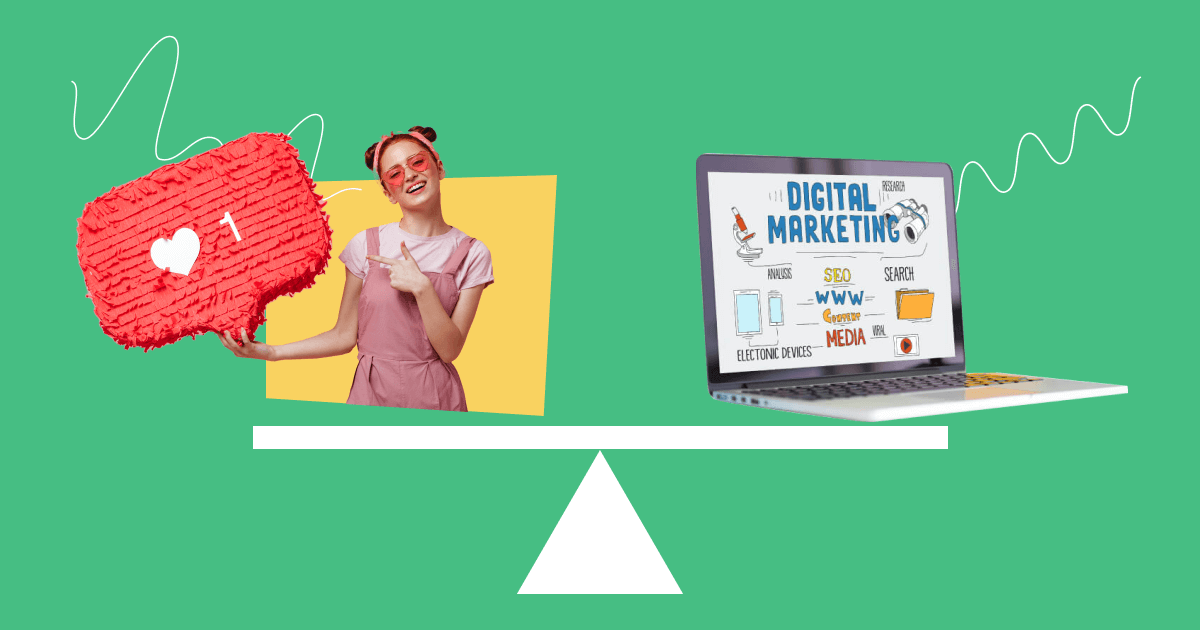
Benefits of Digital Marketing
- Encompasses a diverse set of strategies and tools you can integrate with one another and expand on when necessary
- Emphasizes the use of analytics and data to help you understand your reach and the efficacy of your campaigns
- Reaches highly targeted audiences
- Conforms to any budget with a high degree of accuracy
- Includes multiple tactics for generating web traffic
Benefits of Influencer Marketing
- Humanistic approach that’s relatable, authentic, and fosters trust with your potential customers
- Support with content creation from collaborating influencers while creating less ad disruption
- Ideal for long-term partnerships and one-off campaigns, simultaneously increasing brand awareness and expanding audience reach
- Flexible opportunities for creativity and collaboration with brand ambassadors and their communities
- Flexible scaling and ROI depending on the influencer and the size of their following
Landing Pages in Influencer Marketing and Digital Marketing
Landing pages play a crucial role in both influencer marketing and digital marketing strategies. In influencer marketing, landing pages are often used as the destination for the traffic generated by influencers. When influencers promote a product or service, they provide a call-to-action (CTA) that leads their followers to a landing page specifically designed for that campaign.
These landing pages are optimized to convert visitors into leads or customers by providing relevant information, incentives, and a clear next step. With a well-designed landing page, brands can ensure a seamless transition from influencer content to a personalized and persuasive conversion experience.
In the broader context of digital marketing, landing pages serve as a key component to drive traffic and conversions. Digital marketing campaigns, such as email marketing, search engine marketing, or social media advertising, often rely on landing pages to convert visitors into leads or customers.
Landing pages are designed to be highly targeted and focused, aligning with the specific campaign objectives. They provide a relevant and compelling message, along with clear CTAs and forms to capture valuable user information. With landing pages, businesses can maximize the impact of their digital marketing campaigns, optimize conversions, and ultimately achieve their marketing goals.
But if you’re not sure how to get started with pages like that, Landingi has a solution for you. Don’t stress over hiring expensive web developers or designers, or even messing around with complicated landing page software.
Our drag-and-drop landing page builder is simple to use and equipped with built-in analytics, AI-powered tools, A/B tests, and features like Smart Sections to help you test and launch your landing pages. Turn more traffic into leads and sales by focusing on what produces the best results. Now, you can create and publish your landing page for free!

